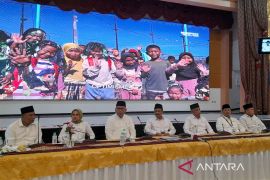"It is hard to reach the target because mothers find it difficult to have access to health services due to geographical and cultural factors," she said after speaking at the 6th Asia Pacific Conference on Reproductive and Sexual Health and Rights (ASCRSHR) here Friday.
The difficulty to lower the maternal mortality rate was not only experienced by Indonesia but also by other countries, she said, adding that her ministry was trying to make it easier for mothers to access health services.
"Four factors are involved in maternal mortality, namely giving birth at an age that was either too young or too old, giving birth too frequently, and giving birth with too short-intervals. If the four factors can be overcome, the maternal mortality rate can drop," the minister said.
She said the Health Ministry was now running a program to educate students at elementary and secondary schools in maintaining reproductive health.
In addition, she said, her ministry was now promoting the wider acceptance of the norm that ideally marriage should be postponed until a woman has reached an age between 24 and 25 years. Currently, 20-30 percent of Indonesian women are married when they were under 20 years old which was considered too young to marry.
She pointed out that low access to health service was a major constraint in efforts to lower the maternal mortality rate in remote areas although health service facilities are available but mothers do not use them.
The minister further said her ministry had introduced several programs to improve mothers` health like improving husbands` role in maintaining their wives` health, a responsive program on gender health and introducing schemes for social help.
"The program provides for free delivery services, free treatment at health facilities, post-delivery treatment and post-delivery services in the family planning program for all expectant women who are not covered by health insurance," she said.
(Uu.KR-LWA/HAJM//S012)
Editor: Priyambodo RH
Copyright © ANTARA 2011










